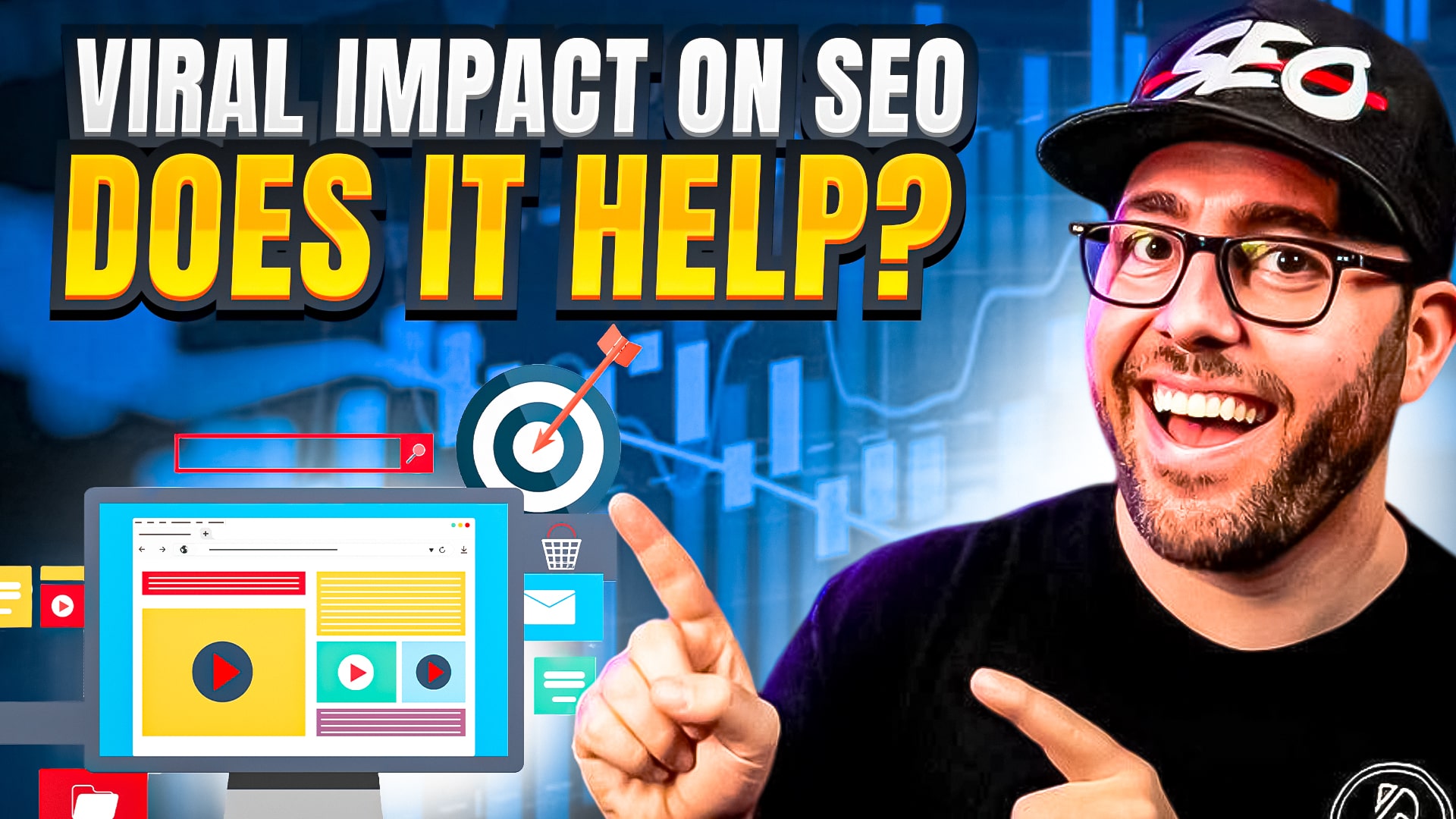
We’ve all heard the stories about a business going viral and then swiftly skyrocketing to success. Videos, memes, and even accidental publicity stunts have turned ordinary companies into overnight sensations. What’s more, the buzz surrounding these viral moments is often contagious, and it’s hard not to wonder if this kind of exposure could work wonders for your own SEO.
But before we get swept away in the exciting concept that is virality, let’s put our detective hats on and take a closer look. Does going viral actually help with SEO, or is it just a fleeting moment of fame with little long-term impact on a company’s organic rankings?
To answer the question, we’ll dive into some viral sensations and investigate their SEO journeys. We’ll explore examples of businesses that went viral, dissect their backlink profiles, and examine whether their newfound fame translated into SEO success. As we navigate through the digital world’s thrilling highs and lows, we’ll uncover valuable insights into the relationship between virality and SEO.
So, buckle up and prepare yourself for a whirlwind ride as we uncover the truth behind going viral and its impact.
Will we find that viral fame is the key to the SEO success you’ve always wanted, or will we discover that there’s more to the story?
Let’s find out!
Key Takeaways:
- Going viral can lead to a huge spike in traffic, social media engagement, and backlinks—but its long-term impact on SEO performance is uncertain.
- High-profile backlinks from press coverage may not necessarily translate into higher search rankings for non-branded keywords.
- Viral fame requires a well-rounded SEO strategy, including on-site optimization, keyword targeting, content marketing, diverse link building, a well-structured website, and high-quality content.
- Brand awareness and traffic may increase due to viral moments, but businesses must already have strong SEO practices in place to properly capitalize on this influx.
- Striking a balance between creative digital PR and traditional link-building strategies is essential for achieving long-term success in organic search.
What Initial Results Tell Us
When a company goes viral, there’s no doubt it’ll see a massive spike in traffic, social media engagement, and, in many cases, backlinks. Sure, some of these might be due to the wrong reasons (Pepsi probably didn’t count on their failed Kendall Janner brand awareness campaign to cause so much backlash), but when virality is fueled by a good PR team, it’s a win-win for all involved.
At first glance, this might seem like a dream come true for your SEO game. But we need to dig deeper to see if these initial results have a lasting impact on a company’s organic rankings.
So, let’s first turn to the immediate aftermath of going viral. When a business gains sudden fame, it can expect to experience a surge in website visits, social media shares, and, most likely, backlinks. If you’re not sure what that term means, the concept is pretty simple: These are the links that point to your website from other websites, which means backlinks are one of the most important factors in determining how high you rank in search engines.
These backlinks can come from many sources, but they’re most often included in news articles, blog posts, and social media posts that are discussing the viral moment.
The downside? Not all backlinks are created equal. While a high-quality backlink from a reputable news outlet might propel your website to the top of search results, a low-quality backlink from a blog with 3 monthly visitors might have little to no impact on SEO. For this reason, we have to keep in mind the quality and relevance of the backlinks a company receives after going viral.
That’s not all, though: We also have to remember that these results are not always sustainable. Sure, a sudden influx of traffic and backlinks might temporarily boost a company’s search rankings, but will this momentum last once the buzz dies down? A brand might be lucky to catch the long wave, but in most cases, it’s more like a short-lived burst of attention—that is, if they don’t have the means to keep riding the high (which we’ll get to later on).
Press Coverage Earning Backlinks
As viral sensations gain traction, they’re often covered by major news outlets, leading to drool-worthy backlinks. But do these high-profile backlinks translate into higher search rankings? Let’s take a closer look at three examples:
- Four Seasons Total Landscaping
This small landscaping company accidentally became the center of attention when a press conference for then-President Trump’s legal team was mistakenly booked at their location—instead of the Four Seasons Hotel. The mix-up led to a frenzy of media coverage, with news outlets, social media users, and late-night talk shows racing to talk about the bizarre moment.As a result, the company gained a substantial number of backlinks from major news sites. Interestingly, while their brand visibility skyrocketed, their ability to capitalize on this exposure for better organic rankings in their industry seemed limited.
The conclusion? A well-rounded SEO strategy goes beyond just generating high-profile backlinks.
- Gravity Payments
This credit card processing company gained widespread media attention when its CEO, Dan Price, decided to cut his salary by 90% to raise the minimum salary for his employees to $70,000 per year. The move was covered extensively by major news outlets, including The New York Times and CNN, and earned praise on social media.Despite the numerous backlinks and significant brand awareness gained from this viral moment, the company’s rankings for non-branded keywords remained mostly unchanged.
The conclusion? Media coverage alone may not directly result in better search rankings for a company’s relevant industry keywords.
- fyi
This website was created during the COVID-19 pandemic to connect laid-off employees with hiring managers in the tech industry. As the pandemic caused widespread job losses, the website quickly boosted its brand awareness and was featured in various news outlets, including Forbes, Business Insider, and TechCrunch.Although Layoffs.fyi earned many high-quality backlinks, most of the traffic was directed to the homepage, meaning it had minimal impact on the overall site’s rankings.
The conclusion? While viral fame can lead to an rise in valuable backlinks, it’s essential to have a strong on-site SEO strategy already in place to take full advantage of so much newfound attention.
What do the cases above tell us? That high-profile backlinks from press coverage can definitely boost a company’s online presence in the short term, but these effects may be short-lived.
To properly leverage their viral fame and achieve long-term success in a realm as competitive as organic traffic and digital PR, these businesses were missing a well-rounded SEO strategy that included:
- Comprehensive on-site optimization
- Targeted keyword research
- Strategic content marketing
- Diverse link building from industry-relevant sources
- A well-structured website
- Consistent, high-quality content
What Does This Mean for SEO?
So, does going viral help with SEO or not? The answer is… it’s complicated. In the cases we examined, going viral didn’t have a significant impact in the long term.
But why were these benefits so short lived? To get to the bottom of it, let’s examine three important factors that all content marketers need to remember—whether they’re going viral or not.
Backlinks and Rankings
Yes, high-quality backlinks from major news sites can contribute to a company’s overall domain authority. However, they don’t always guarantee higher rankings for non-branded keywords (not by themselves, at least). To improve your chances of long-term success in organic searches, you’ll need a well-rounded SEO strategy that includes on-site optimization, keyword targeting, and comprehensive content marketing.
Brand Awareness and Traffic
It’s no secret that going viral can significantly increase brand awareness and drive traffic to a company’s website. With increased visibility, you could earn more leads and open the door to more business opportunities. But to make the most of this influx, you’ll also need to meet it with strong SEO practices: like having a well-structured website with relevant content that appeals to your target audience.
Digital PR and Content Marketing
One thing is for sure: none of the above means that digital PR teams, blog posts, and other brand-building efforts are useless. In fact, these tactics can help companies grow their online presence, generate buzz, and create relationships with industry influencers. Even better, if you already have the makings of a SEO strategy, you can combine the two to extend the lifespan of your content, advertisements, and more. So, when you do go viral, you’ll be in a position to keep the popularity going.
Final Thoughts
We hear you––it’s only natural to want to jump right into exciting digital PR campaigns and watch that sweet traffic roll in once they start going viral. But this is not exactly the be-all and end-all of brand awareness: our investigation has shown that going viral might not be the golden ticket to SEO success like we initially thought.
Instead, it’s important to strike a balance between creative digital PR and more traditional link-building strategies to achieve a strong online presence, better rankings, and long-term success in organic search.
If you have examples of digital PR links making a significant impact on a business, feel free to share them with me on Twitter. Together, we can continue to unravel the mysteries of SEO!
